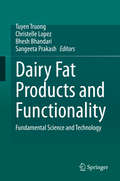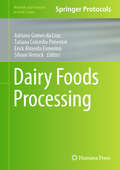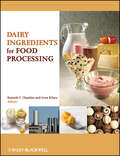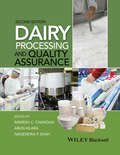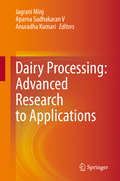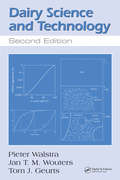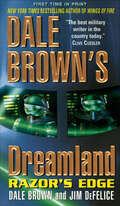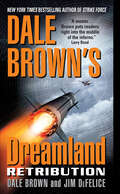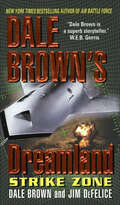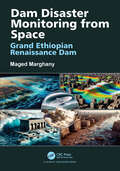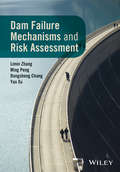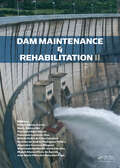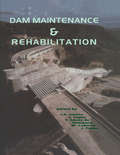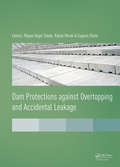- Table View
- List View
Daemon: Die Welt Ist Nur Ein Spiel (Daemon Series)
by Daniel SuarezWhen a designer of computer games dies, he leaves behind a program that unravels the Internet's interconnected world. It corrupts, kills, and runs independent of human control. It's up to Detective Peter Sebeck to wrest the world from the malevolent virtual enemy before its ultimate purpose is realized: to destroy civilization...From the Paperback edition.
Daily Poison: Pesticides - an Underestimated Danger
by Johann G. ZallerThis book is a sound science report about the consequences of pesticides to nature, health and environment.The book shares essential insights into the use of pesticides in agriculture, discusses the politics, rhetoric and profits involved, addresses the potential health and ecological risks of pesticides in our daily lives, and debates possible solutions. Does sustainable agriculture exist, and is agriculture without pesticides possible at all?Moreover, the author gives insight into his scientific work, the set-up of the experiments, and also writes about his very own experiences with the media and press after publication of his studies.For many years, Johann G. Zaller, an ecologist at the University of Natural Resources and Life Sciences in Vienna, and his team, have been researching applied chemicals and their effects on the environment. Their findings, together with relevant literature and media reports, are presented in this book, which offers a unique resource for anyone who wants to know the nature and background of pesticides and how we come into contact with them in our daily lives. Ever ate an apple? Read this book!
Dairy Chemistry and Biochemistry
by P. F. Fox T. Uniacke-Lowe P. L. H. Mcsweeney J. A. O'MahonyThis book is the most comprehensive introductory text on the chemistry and biochemistry of milk. It provides a comprehensive description of the principal constituents of milk (water, lipids, proteins, lactose, salts, vitamins, indigenous enzymes) and of the chemical aspects of cheese and fermented milks and of various dairy processing operations. It also covers heat-induced changes in milk, the use of exogenous enzymes in dairy processing, principal physical properties of milk, bioactive compounds in milk and comparison of milk of different species. This book is designed to meet the needs of senior students and dairy scientists in general.
Dairy Fat Products and Functionality: Fundamental Science and Technology (Springerbriefs In Food, Health, And Nutrition Ser.)
by Bhesh Bhandari Tuyen Truong Christelle Lopez Sangeeta PrakashThis work highlights a new research area driven by a material science approach to dairy fats and dairy fat-rich products where innovative dairy products and ingredients can be tailor-made. Cutting edge topics such as tribology of dairy fats and dairy products, manipulation of differentiated-sized milk fat globules, milk fat interesterification for infant formula, structuring of lipids in dairy products and production of human milk fat substitutes by including dairy fats are featured in dedicated chapters authored by international scientific experts from across the globe. The text also presents in-depth research on proteomic characterization, digestion and the nutritional functionality of milk fat globule membrane. The biosynthesis, chemistry, digestion and nutritional roles of milk lipids, physics of dairy fats, structure and functionality of the milk fat globule membrane, analytical methods, materials science, technology and manufacturing of dairy fat-rich products such as butter, dairy fat spreads, dairy creams, cream powders and ghee are also covered in-depth.Dairy Fat Products and Functionality: Fundamental Science and Technology is a useful reference text for technologists and scientists interested in advancing their fundamental knowledge of dairy fat and dairy products as well as using a materials science and technology approach to guide efforts or widen research opportunities in optimizing the functionality of these products. From their physics and chemistry to their nutritional values and methodologies, this comprehensive and innovative text covers all the necessary information needed to understand the new methods and technologies driving the modern production of milk fat products.
Dairy Foods Processing (Methods and Protocols in Food Science)
by Adriano Gomes da Cruz Tatiana Colombo Pimentel Erick Almeida Esmerino Silvani VerruckThis volume aims to introduce the broad field of protocols that can be used for dairy foods and beverages production. Written in the format of the Methods and Protocols in Food Science series, the chapters include an introduction to the respective topic, list necessary materials and reagents, detail well-established and validated methods for readily reproducible laboratory protocols and contain notes on how to avoid or solve typical problems. Authoritative and cutting-edge, Dairy Foods Processing aims to provide sufficient guidance and a basic understanding of the tools, materials, and supplies needed to get started in this important food discipline.
Dairy Ingredients for Food Processing
by Ramesh C. Chandan Arun KilaraThe objective of this book is to provide a single reference source for those working with dairy-based ingredients, offering a comprehensive and practical account of the various dairy ingredients commonly used in food processing operations. The Editors have assembled a team of 25 authors from the United States, Australia, New Zealand, and the United Kingdom, representing a full range of international expertise from academic, industrial, and government research backgrounds. After introductory chapters which present the chemical, physical, functional and microbiological characteristics of dairy ingredients, the book addresses the technology associated with the manufacture of the major dairy ingredients, focusing on those parameters that affect their performance and functionality in food systems. The popular applications of dairy ingredients in the manufacture of food products such as dairy foods, bakery products, processed cheeses, processed meats, chocolate as well as confectionery products, functional foods, and infant and adult nutritional products, are covered in some detail in subsequent chapters. Topics are presented in a logical and accessible style in order to enhance the usefulness of the book as a reference volume. It is hoped that Dairy Ingredients for Food Processing will be a valuable resource for members of academia engaged in teaching and research in food science; regulatory personnel; food equipment manufacturers; and technical specialists engaged in the manufacture and use of dairy ingredients. Special features: Contemporary description of dairy ingredients commonly used in food processing operations Focus on applications of dairy ingredients in various food products Aimed at food professionals in R&D, QA/QC, manufacturing and management World-wide expertise from over 20 noted experts in academe and industry
Dairy Is Good for You! (Healthy Foods)
by Gloria KosterYogurt, cheese, and kefir . . . What do these dairy foods have in common? They’re all healthy foods! In this Pebble Explore book, explore where dairy foods come from, what nutrition they provide, and how they help form a healthy diet. Filled with fantastic facts, including dairy alternatives, young readers and report writers will be hungry for more.
Dairy Is Good for You! (Healthy Foods)
by Gloria KosterYogurt, cheese, and kefir . . . What do these dairy foods have in common? They’re all healthy foods! In this Pebble Explore book, explore where dairy foods come from, what nutrition they provide, and how they help form a healthy diet. Filled with fantastic facts, including dairy alternatives, young readers and report writers will be hungry for more.
Dairy Processing and Quality Assurance
by Ramesh C. Chandan Arun Kilara Nagendra P. ShahDairy Processing and Quality Assurance, Second Edition describes the processing and manufacturing stages of market milk and major dairy products, from the receipt of raw materials to the packaging of the products, including the quality assurance aspects. The book begins with an overview of the dairy industry, dairy production and consumption trends. Next are discussions related to chemical, physical and functional properties of milk; microbiological considerations involved in milk processing; regulatory compliance; transportation to processing plants; and the ingredients used in manufacture of dairy products. The main section of the book is dedicated to processing and production of fluid milk products; cultured milk including yogurt; butter and spreads; cheese; evaporated and condensed milk; dry milks; whey and whey products; ice cream and frozen desserts; chilled dairy desserts; nutrition and health; sensory evaluation; new product development strategies; packaging systems; non-thermal preservation technologies; safety and quality management systems; and dairy laboratory analytical techniques. This fully revised and updated edition highlights the developments which have taken place in the dairy industry since 2008. The book notably includes: New regulatory developments The latest market trends New processing developments, particularly with regard to yogurt and cheese products Functional aspects of probiotics, prebiotics and synbiotics A new chapter on the sensory evaluation of dairy products Intended for professionals in the dairy industry, Dairy Processing and Quality Assurance, Second Edition, will also appeal to researchers, educators and students of dairy science for its contemporary information and experience-based applications.
Dairy Processing: Advanced Research to Applications
by Jagrani Minj Aparna Sudhakaran V Anuradha KumariThis book focuses on advanced research and technologies in dairy processing, one of the most important branches of the food industry. It addresses various topics, ranging from the basics of dairy technology to the opportunities and challenges in the industry. Following an introduction to dairy processing, the book takes readers through various aspects of dairy engineering, such as dairy-based peptides, novel milk products and bio-fortification. It also describes the essential role of microorganisms in the industry and ways to detect them, as well as the use of prebiotics, and food safety. Lastly, the book examines the challenges faced, especially in terms of maintaining quality across the supply chain. Covering all significant areas of dairy science and processing, this interesting and informative book is a valuable resource for post-graduate students, research scholars and industry experts.
Dairy Science and Technology
by Thom HuppertzBuilding upon the scope of its predecessors, Dairy Science and Technology, Third Edition offers the latest information on the efficient transformation of milk into high-quality products. It focuses on the principles of physical, chemical, enzymatic, and microbial transformations. The book provides a thorough understanding of milk composition and properties and the changes that occur in milk and its products during processing and storage. The new edition features 10 new chapters covering milk in the dairy chain, primary milk production, ice cream, infant formula products, and medical nutrition products, among others.Key Features Offers expanded coverage of the chemistry, physics, and microbiology of milk Presents additional information about the basic science necessary to understand properties and processes Provides new sections on milk formation and variability in milk composition and components Includes treatments on the nutritional aspects of milk components and of certain products, including infant formula, medical nutrition, and performance nutrition products
Dairy Science and Technology (Food Science and Technology)
by Pieter Walstra P. Walstra Jan T. Wouters Tom J. GeurtsBuilding upon the scope of its predecessor, Dairy Science and Technology, Second Edition offers the latest information on the efficient transformation of milk into high-quality products. It focuses on the principles of physical, chemical, enzymatic, and microbial transformations.The authors, highly regarded educators and researchers, div
Dalbergia sissoo: Biology, Ecology and Sustainable Agroforestry
by Siddra IjazDalbergia sissoo (Shisham) is a perennial tree species native to the Asian subcontinent. It is an economically significant tree for its value in forestry, agroforestry, and horticulture. The high-quality timber imparts this tree species a significant commercial value. Besides valuable timber, it also exhibits medicinal, industrial, and agroforestry allied attributes. This tree has been introducing to the geographical regions where it does not exist naturally, which indicates its significant properties, getting diverse communities' attention. This book provides information about this tree species based on the latest research trends and development on the subject. It addresses researchers, forestry specialists, natural resource managers, or all those interested in the rehabilitation, maintenance, and management of Dalbergia sissoo tree resources. Key features Discusses botanical features, reproductive characters, taxonomy, geographical distribution, and ecological importance of Dalbergia sissoo. Highlights physiological and biochemical features of Dalbergia sissoo and vis-à-vis contribution to the sustainability of the ecosystem. Explains ethnobotany of Dalbergia sissoo, its ethnobotanical uses to cure various ailments, and contribution to the pharmaceutical industry. Provides a comprehensive account of insect pest threat and diseases as a leading cause of deteriorating growth, cultivation, productivity, and quality losses in Dalbergia sissoo. Describes conventional breeding methods and non-conventional strategies for genetic improvement, biodiversity, and conservation of D. sissoo Relays sustainability, socio-economic importance, agroforestry trends, current scenario, and future challenges of D. sisso
Dale Brown's Dreamland: End Game (Dreamland Thrillers #8)
by Dale Brown Jim DeFeliceAn experimental weapon must be deployed to save a US ally from terrorists in the New York Times–bestselling author’s military techno-thriller.India is the latest target of radical Islamic jihadists. The world watches as tensions escalate between the uneasy giant and its longtime nemesis Pakistan—with China waiting in the wings, eager to flex its military might. The only hope of avoiding a nuclear showdown is found inside a top-secret military facility deep in the Nevada desert . . . Dreamland is where the future of high-tech warfare is conceived and constructed. Now its masterminds are charged with the task of locating the mysterious source of the terror and ending it—swiftly and permanently.Every technological wonder in their arsenal is utilized—from an awesome new hybrid Navy destroyer to robot Flighthawks. But the fate of the region and the world will depend on the newest brainchild of the Dreamland team: an unproven instrument of ultimate power code-named End Game.
Dale Brown's Dreamland: Razor's Edge (Dreamland Thrillers #3)
by Dale Brown Jim DeFeliceThe hunt is on for a mystery weapon shooting down American planes over Iraq in the New York Times–bestselling author’s high-tech military thriller series.Hidden in the Nevada desert is Dreamland—a top-secret research center developing experimental artillery and aircraft that push beyond the cutting edge. It is also home to Whiplash—a covert team of special forces trained to deploy the high-tech weapons in extreme situations. Whiplash’s latest mission begins when a series of American planes are shot down over Iraq in mysterious circumstances. There is no way that conventional weapons could have executed the deadly efficient strikes. Can the Iraqis have developed a laser capable of causing such mayhem? Fearing a major international crisis, the President sends a call out to Dreamland. Within hours, some of the most sophisticated aircraft in the world are heading for the Gulf, with orders to track down the mystery weapon—and destroy it.
Dale Brown's Dreamland: Retribution (Dreamland Thrillers #9)
by Dale Brown Jim DeFeliceThe elite Dreamland team faces their most deangerous mission as terrorists plot a massive nuclear attack on American soil in this military techno-thriller.Dreamland, a top-secret military facility in the Nevada desert, is where high-tech innovations are developed to keep America safe from its enemies. After defusing threats across the globe, the team must now use its stealth, raw nerve, and technology to stop a terror from striking at home. With more than two dozen nuclear devices unaccounted for, the global masters of terror have set a catastrophe in motion: a surprise attack more deadly than Pearl Harbor and 9/11 combined. If the nation is to survive, Lieutenant Colonel Tecumseh “Dog” Bastian and his crew will have to reach deep into their cutting-edge arsenal. And they’ll have to do it short-handed—because two of Dreamland’s best and bravest have been lost at sea.
Dale Brown's Dreamland: Satan's Tail (Dreamland Thrillers)
by Dale Brown Jim DeFeliceNew York Times–Bestselling Authors: When terrorists take to the sea, America attacks from the air . . . In the Nevada desert, the high-tech future of warfare is being built at a top-secret military facility called Dreamland . . . As extremist Islamic pirates, armed and supported by a powerful Saudi terrorist, prey on civilian vessels in the Gulf of Aden, America aggressively answers with serious muscle—a next-generation littoral warship with a full range of automated weapons systems that the enemy has dubbed “Satan's Tail.” But unforeseen technological problems—combined with the suicidal tendencies of a fanatical foe—mean support is needed from above, and a pair of Dreamland’s awesome Megafortresses and their Flighthawk escorts are dispatched to the war zone. However, bitter professional rivalries threaten to damage, perhaps even destroy, the mission, as a vengeful opponent takes advantage of the disruption to strengthen his outlaw navy and set its sights horrifically high—raising the stakes in a battle the U.S. and the world simply cannot afford to lose.Acclaim for Dale Brown“When a former pilot turns his hand to writing thrillers you can take their authenticity for granted. His writing is exceptional and the dialogue, plots and characters are first-class.” —Sunday Mirror“Few novelists can craft an aerial battle scene more strategically.” —Publishers Weekly“Brown puts us into the cockpits of wonderful machines and gives us quite a ride . . . authentic and gripping.” —The New York Times
Dale Brown's Dreamland: Strike Zone (Dreamland Thrillers #5)
by Dale Brown Jim DeFeliceIn this military thriller, the Dreamland team must track down a new super-weapon shockingly similar to its own bleeding edge technology.An Asian war that would have escalated into a nuclear nightmare has been halted, thanks to the raw courage, unparalleled skill, and total commitment of the Dreamland force. But an analysis of radar data has revealed the presence of an unknown super-weapon in the area: a robot warplane with terrifying capabilities, dubbed the “ghost clone.” Though seemingly related to Dreamland’s own U/MF Flighthawk, no one knows where this fearsome instrument of destruction originated. And a rogue nation possessing a squadron of them could wreak unimaginable havoc on an unsuspecting free world. Now nothing less than a brazen, brilliantly conceived deception will lure the ghost clone out of hiding—and only a daring strike on enemy soil can avert a tomorrow too terrible to consider . . . if it isn’t already too late.
Dale Earnhardt Jr.: Out of the Shadow of Greatness
by Mike HembreeDale Earnhardt Jr.’s name virtually assured that his life would not be ordinary. Over the past decade, he has fulfilled that destiny. His father, one of the most successful drivers in the history of international motorsports, gave his son more than his name. Dale Earnhardt Sr. placed Dale Jr. in position to follow the footsteps and tire tracks he had left from Darlington to Daytona, from coast to coast, from one championship to the next. Entering 2001, Junior was set to turn the sport on its ear. Instead, his world was rocked in the first race of the season when Dale Sr., racing behind him in a wild finish to the Daytona 500, crashed into the outside wall and was killed. The racing world mourned, and Junior’s life changed in many ways. Dale Earnhardt Jr.: Out of the Shadow of Greatness tells the story of this remarkable young man’s journey from teenage dreamer to Winston Cup winner, from Street Stock racer to 200 mph superstar, from son of the greatest to a champion in his own right. Against the backdrop of one of sport’s biggest tragedies, he continues to carry the Earnhardt name to new heights. This newly revised edition is a must for any NASCAR fan.
Dam Disaster Monitoring from Space: Grand Ethiopian Renaissance Dam
by Maged MarghanyA groundbreaking synthesis of science, technology, and geopolitics, this book delivers an unprecedented analysis of the Grand Ethiopian Renaissance Dam (GERD). Leveraging advanced quantum computing, radar interferometry, and remote sensing—including Sentinel-1, ICEYE, and TerraSAR-X—this work reveals hidden structural vulnerabilities in GERD and models catastrophic breach scenarios. Featuring the original Marghany Hologram-TomoSAR algorithm and new quantum phase unwrapping methods, it offers critical insights into environmental, engineering, and military dimensions. From sediment saturation to seismic risk, and from biblical prophecy to regional diplomacy, this book challenges conventional narratives and opens new frontiers in monitoring, forecasting, and strategic response to GERD's evolving dynamics.
Dam Failure Mechanisms and Risk Assessment
by Limin Zhang Ming Peng Dongsheng Chang Yao XuThis book integrates the physical processes of dam breaching and the mathematical aspects of risk assessment in a concise manner • The first book that introduces the causes, processes and consequences of dam failures• Integrates the physical processes of dam breaching and the mathematical aspects of risk assessment in a concise manner• Emphasizes integrating theory and practice to better demonstrate the application of risk assessment and decision methodologies to real cases• Intends to formulate dam-breaching emergency management steps in a scientific structure
Dam Maintenance and Rehabilitation II
by Rafael Romeo García Mario Andreu Mir Francisco HijósBitrián Raimundo Lafuente Dios MoisésRubín de Célix Caballero Mariano de Andrés Rodríguez-Trelles Alejandro Carrasco Mínguez María Soledad Martín-Cleto Sánchez Miguel Alonso Pérez de Ágreda José María Villarroel González-ElipeAs dams age, they are subject to a series of external agents and processes which tend to deteriorate the qualities with which they were originally conceived to stand against these actions. At the same time, it is often necessary to respond to increased safety standards, either in the structural or hydrological fields. Reservoir sedimentation or wat
Dam Maintenance and Rehabilitation: Proceedings of the International Congress on Conservation and Rehabilitation of Dams, Madrid, 11-13 November 2002
by J. A. Llanos J. Yagüe F. Sáenz de Ormijana M. Cabrera J. PenasDuring the life of a dam, changes in safety standards, legislation and land use will inevitably occur, and functional deterioration may also appear. To meet these challenges, these Proceedings from a panel of international experts assess, define and re-evaluate the design criteria for the construction of dams and the many attendant issues in on-going maintenance and management. Authors include international specialists: academics, professionals and those in local government, utilities and suppliers. Practitioners from these same fields will find the book a useful tool in acquiring a comprehensive knowledge of managing and retrofitting dams, so that they can continue to meet society's needs.
Dam Protections against Overtopping and Accidental Leakage
by Eugenio Oñate Miguel Ángel Toledo Rafael MoránIn the last decades, the technology of dam protection has undergone major advancements. The increasing demand for safety in modern society has created the need for cost-effective measures to protect critical infrastructure such as dams. This situation has resulted in the drafting of new regulations and technical manuals in countries like Norway, Sw
Dam Safety Management / Gestion de la Sécurité des Barrages: Pre operational phases of the dam life cycle / Phases de conception, construction et mise en service (ICOLD Bulletins Series #175)
by Cigb IcoldDam Safety Management is a major concern during the entire lifetime cycle of a dam scheme. This is particularly true for the operational phase of the scheme that represents by far the longest period in its lifetime cycle. Bulletin 154 presented a general approach and concepts to be applied to dam operation. The current Bulletin 175 extends the developed concepts to all phases preceding the operational phase. Many risks associated with the operation of existing dams have their origins in other phases preceding the actual operation. Although there are numerous ICOLD Bulletins addressing technical aspects of planning, design, construction and commissioning of dams, there is not a single Bulletin which covers the subject in a comprehensive manner. The current document is a first attempt to capture all relevant dam safety aspects in all preoperational phases by systematically characterizing the actors involved, their roles, the activities and complex interactions present in different phases of the dam lifecycle. An Overarching Safety Management System is specifically developed that can be applied to all actors involved. La gestion de la sécurité des barrages est une préoccupation majeure pendant tout le cycle de vie d'un projet de barrage. Cela est particulièrement vrai pour la phase opérationnelle du système qui représente de loin la période la plus longue de son cycle de vie. Le Bulletin 154 présente une approche générale et des concepts à appliquer à l'exploitation des barrages. Le Bulletin 175 actuel étend les concepts développés à toutes les phases précédant la phase d'exploitation. De nombreux risques associés à l'exploitation des barrages existants ont leur origine dans d'autres phases précédant l'exploitation proprement dite. Bien qu'il existe de nombreux bulletins ICOLD traitant des aspects techniques de la planification, de la conception, de la construction et de la mise en service des barrages, il n'existe pas un seul bulletin qui couvre le sujet de manière exhaustive. Le document actuel est une première tentative de capturer tous les aspects pertinents de la sécurité des barrages dans toutes les phases pré-opérationnelles en caractérisant systématiquement les acteurs impliqués, leurs rôles, les activités et les interactions complexes présentes dans les différentes phases du cycle de vie du barrage. Un système global de gestion de la sécurité est spécifiquement développé et peut être appliqué à tous les acteurs impliqués.



